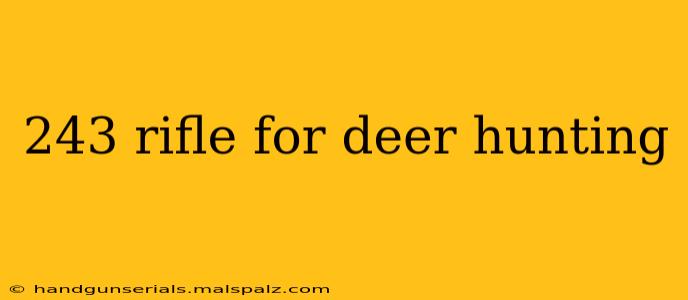The .243 Winchester remains a popular choice for deer hunting, particularly among those new to the sport or seeking a versatile round. Its manageable recoil, flat trajectory, and excellent accuracy make it a compelling option, but is it the right choice for you? This comprehensive guide delves into the pros and cons of using a .243 for deer hunting, helping you make an informed decision.
Understanding the .243 Winchester Cartridge
The .243 Winchester, introduced in 1955, is a relatively lightweight cartridge compared to some of its more powerful counterparts. This smaller caliber (.243 inches) fires a relatively lighter bullet, usually ranging from 55 to 100 grains. This contributes to its lower recoil, making it easier to handle, especially for beginners or younger hunters. The flatter trajectory, meaning less bullet drop over distance, increases accuracy at longer ranges.
Advantages of Using a .243 for Deer Hunting
-
Low Recoil: This is a significant advantage, particularly for new hunters or those with less upper body strength. Reduced recoil translates to quicker follow-up shots and improved accuracy.
-
Flat Trajectory: The .243's trajectory is relatively flat, meaning the bullet holds its point of aim for longer distances before significant drop occurs. This simplifies ranging and aiming, particularly crucial for shots beyond 100 yards.
-
Accuracy: With the right rifle and ammunition, the .243 Winchester is known for its remarkable accuracy. This accuracy is essential for ethical and successful deer hunting.
-
Versatility: The .243 can be effectively used for various game, including deer of various sizes, coyotes, and even some smaller varmints. Its versatility makes it a great all-around hunting cartridge.
Disadvantages of Using a .243 for Deer Hunting
-
Energy at Longer Ranges: While possessing a flat trajectory, the .243's energy decreases more rapidly at longer distances compared to larger calibers like .30-06 or .308. This is important to consider when hunting larger deer or shooting at longer ranges. Shot placement becomes paramount.
-
Limited Stopping Power: Compared to heavier calibers, the .243 may offer less stopping power, especially on larger deer. Precise shot placement, ideally targeting vital organs, is absolutely crucial for a clean and quick kill.
-
Bullet Selection: Choosing the right bullet weight and construction is critical. Using unsuitable ammunition can drastically affect accuracy and effectiveness.
Choosing the Right Ammunition
Ammunition selection significantly impacts performance. For deer hunting, consider:
-
Bullet Weight: 80-100 grain bullets are generally preferred for deer hunting with the .243 Winchester, offering a good balance of energy and trajectory.
-
Bullet Construction: Choose bullets designed for hunting, such as bonded or controlled expansion designs. These are engineered to retain their integrity and expand reliably upon impact.
Ethical Hunting Considerations
Using any caliber ethically requires responsible hunting practices. With the .243, understanding its limitations regarding energy at longer ranges and the need for precise shot placement is paramount. Always ensure you're within a comfortable and ethical shooting distance, and take only responsible shots.
Conclusion
The .243 Winchester is a capable and popular cartridge for deer hunting, especially for those valuing manageable recoil and accuracy. However, understanding its limitations, especially regarding energy at longer ranges, and prioritizing precise shot placement are crucial. Choosing the right ammunition and practicing diligently are essential for successful and ethical hunts. The .243, while effective, isn't a one-size-fits-all solution; consider your hunting style, the size of deer you typically hunt, and your shooting capabilities before making your decision.

